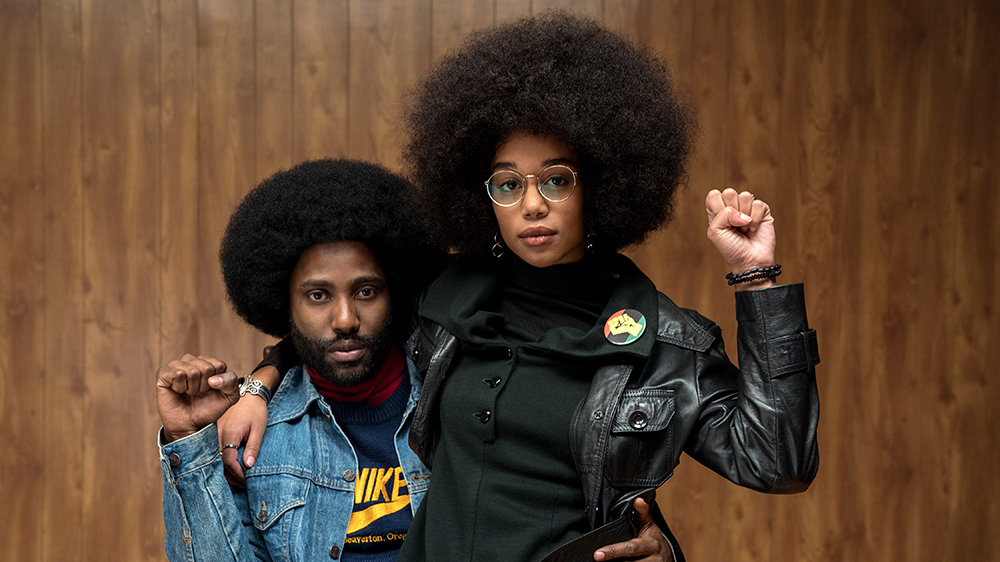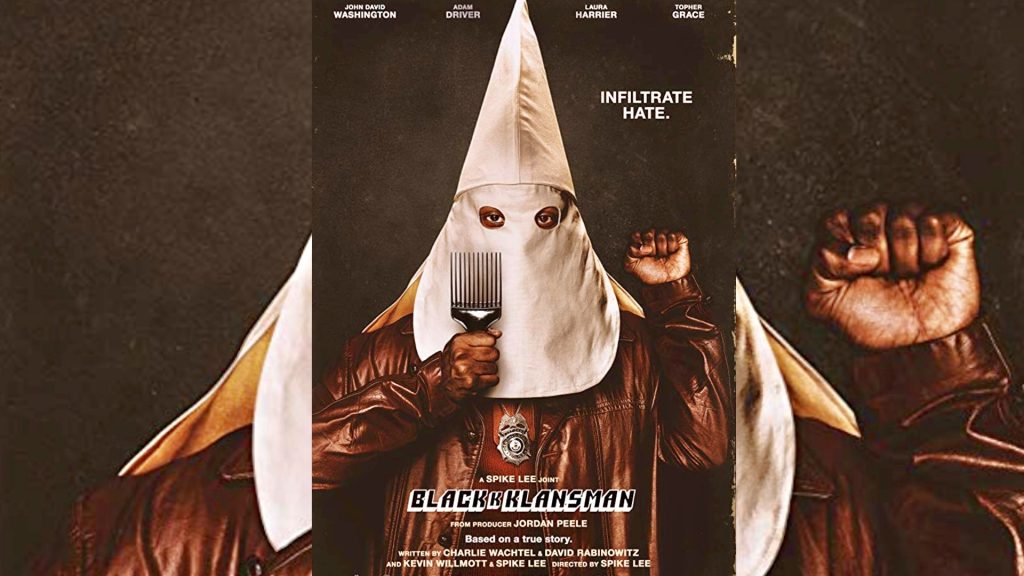Spike Lee gets his mojo back exactly when we need him the most.

Blackkklansman starts with a curious but remarkable prologue: a scene taken from a classic Hollywood epic where a woman is shocked by the sheer scope of injured soldiers in the aftermath of a civil war battle. The swooping camera reveals lines and lines of moaning soldiers, only to stop, as the score hits its most heroic notes, on the Confederate flag. The lady is Viviane Leigh and this is, of course, a pivotal moment from Gone With The Wind. Right off the bat, before we are even introduced to our protagonists, Spike Lee takes a stand to reminds us the movie we’re about to watch is directly related to, or perhaps even a product of, a society that has a nostalgic gaze towards racism. And that we’re all accomplice to this crime.
Based on “some fo’real fo’real sh*t” (as the first title card tells us, asterisk included), Blackkklansman chronicles the story of Ron Stallworth (John David Washington), the first African-American police officer in Colorado Springs, who lead an undercover mission to infiltrate the local Ku Klux Klan chapter, with the help of his colleague Flip Zimmerman (Adam Driver). Stallworth would arrange the meetings over the phone, going as far as meeting the Grand Wizard David Duke himself (Topher Grace in a career’s best), while Zimmerman would be the physical front, the white face that Stallworth, for obvious reasons couldn’t be.
On the surface, the film is a typical crime procedural drama, and a damn good one at that. It’s entertaining and intense, and occasionally funny (especially at the expense of the white supremacists). There are delicious moments, like the terrific interview scene with actor Isiah Whitlock, Jr. and the moment where Stallworth talks to his Black activist girlfriend Patrice (Laura Harrier) about iconic African-American characters in recent movies – from Coffy to Cleopatra Jones, Shaft to Superfly. The film could simply be this merging of cop drama with gentle pop culture moments and it would already be worth our time.
But Spike Lee knows the importance of this story, especially in our current political and social climate, and the end product is so much more than a piece of entertainment, it’s a powerful piece of social commentary. The 1970s setting provides the perfect backdrop to this commentary; the era where the civil rights movement was slowly turning from its fringe roots and finding representation in the mainstream. A moment that represents what we thought was the last hurrah of a retrograde philosophy. It wasn’t, and Lee succeeds in finding every parallel he can with today.

This is an angry film, and it’s refreshing to see a new Spike Lee joint that has the raw emotion he lacked in the first half of his career. Blackkklasman shares more DNA with Crooklyn or Do The Right Thing than it does with a cop drama; the film’s heart is in the complexity of all the messages he successfully juggles. Every scene, no matter how superfluous it appears to be, aims to reveal more about how society faces its own cultural conundrums. He’s not trying to pose questions or simply point fingers, he’s unashamedly educating us.
The Gone With The Wind scene is an important part of the puzzle. In fact, cinema is a recurring theme in the film, starting with that opening scene and appearing again when the protagonists discuss blaxsploitation characters. Cinema, what was once used as a political tool to galvanise racism, is reclaimed by Lee to fight and expose that same racism. No where is this more apparent than in the film’s centre pillar, a tremendous sequence that cuts between the KKK watching D.W. Griffith’s seminal film Birth Of A Nation, and a Black Student Union event where a guest speaker (Harry Belafonte) tells a shocking account of witnessing a lynching in his childhood. It’s chilling, yet effective filmmaking, which climaxes in the two strands ending almost in the same way – the white supremacists shouting ‘white power’ intercut with the African Americans proclaiming ‘Black Power.’ What could easily be a reductive way of joining both factions as two sides of the same coin, is instead masterfully handled; Lee contextualises both cries to show the fundamental differences between them. It’s the ultimate argument against ‘all lives matter,’ an emotional and brutal thesis on racial politics.
When the story of Stallworth et al ends, there would be reason enough to smile if it wasn’t for the reminders that this is a true story (“fo’real”), set four decades ago, and yet we still haven’t reached a happy ending. The film must end, but the film’s era has yet to live through Angela Davis, George Jackson, Rodney King and the L.A. riots, Trayvon Martin, Black Lives Matter, Donald Trump and the resurface of David Duke in Charlottesville.
And it’s in this last, tragic event that Spike Lee ends the film. In his most aggressive statement, Lee brings the film full circle, from the heroic representation of the civil war, to the KKK marching in Virginia without their hoods. He doesn’t intend for the film to be a mourning for the past, but for the present. Blackkklansman is the most powerful commentary on modern day race relations you will see this year.
The Best
Spike Lee’s art has always been confronting, thematically and visually. Here he pulls maybe his most impressive trick – a great entertaining film that is lifted by the weight of its message.
The Rest
I could easily fill three times the length of this article, thoroughly analysing every single corner in the film. From the portrayal of the police, to the careful design of the KKK member’s social background. And oh so much more. This one is mandatory viewing.
FIB Rating: ★★★★★
Have you seen Blackkklansman yet? Let us know what you think in the comments below!







